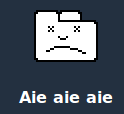I’m strangely fascinated by inappropriate, colloquial error messages. Some software teams insist on smuggling them in despite what the user interface guidelines say about clear, useful error messages. Such is the case with the Google Chrome web browser and its “Aw, Snap” error message when a page crashes.

I had been seeing this message with inordinate frequency (3 guesses why) when I started to wonder how this translates into some of the other 50 languages that Chrome supports. I switched my environment’s language to ‘fr’ and saw what appeared to be Francophonic squealing:

My goodness, did they really task their translation team with finding a culturally accurate yet wince-inducing exclamation phrase for this screen in every supported language? Probably not, considering the en_US and en_GB phrases are the same (I’m assuming the phrase in question is an American expression but it could very well have crossed the pond by now). If it seems like I’m putting a lot of thought into this, imagine how much consideration various Google committees had to exert; Google is famous for not making moves unless the data says it’s okay (e.g., testing 41 shades of blue). I guess from that perspective, the translation team is lucky they didn’t get stuck with translating “Oh no this web page di’n’t just crash on you!”
While I’m fairly certain that “Aie aie aie” is not a literal translation for “aw, snap”, the following languages do feature literal translations (at least according to Google Translate): Czech, Danish, Estonian, Finnish, Korean, Slovenian, and Portuguese (Brazilian, while pt_PT translates to “Ah, balls!”). A number of other languages (like German, Spanish, and Croatian) feature translations that quite clearly seem to be “Oh no!”. Turkish’s exclamation is simply “Error” which might be the most appropriate of the bunch. Vietnamese’s phrase translates to “Sorry”, which is also reasonable.
In yet another in a long series of useless exercises, I have assembled a gallery of all the Google Chrome translations for “Aw, snap”. See what your favorite language uses for the message and whether in makes any sense (alphabetical by language code):
(am) Amharic |
(ar) Arabic |
(bg) Bulgarian |
(bn) Bengali |
(ca) Catalan |
(cs) Czech |
(da) Danish |
(de) German |
(el) Greek |
(en) English (both GB & US) |
(es) Spanish |
(et) Estonian |
(fil) Filipino |
(fi) Finnish |
(fr) French |
(gu) Gujarati |
(he) Hebrew |
(hi) Hindi |
(hr) Croatian |
(hu) Hungarian |
(id) Indonesian |
(it) Italian |
(ja) Japanese |
(kn) Kannada |
(ko) Korean |
(lt) Lithuanian |
(lv) Latvian |
(ml) Malayalam |
(mr) Marathi |
(nb) Norwegian Bokmål |
(nl) Dutch |
(or) Oriya |
(pl) Polish |
(pt_BR) Portuguese (Brazil) |
(pt_PT) Portuguese (Portugal) |
(ro) Romanian |
(ru) Russian |
(sk) Slovak |
(sl) Slovenian |
(sr) Serbian |
(sv) Swedish |
(sw) Swahili |
(ta) Tamil |
(te) Telugu |
(th) Thai |
(tr) Turkish |
(uk) Ukrainian |
(vi) Vietnamese |
(zh_CN) Simplified Chinese |
(zh_TW) Traditional Chinese |
It’s a bit strange that the Swedish, Norwegian, and Danish translations are so different. Those phrases have quite different meanings, only the Danish getting close to the English original. The Norwegian one you can guess, and the Swedish translates (back) as “Oops, an error has occurred!”
Pingback: Tweets that mention Aw, Snap In Every Language | Breaking Eggs And Making Omelettes -- Topsy.com
Polish translation is literary “Not good”, while Ukrainian +- “Here is devil”
The Japanese one simply says “error”
As a multilangual speaker myself I can confirm the following:
– the German version is very “light” compared to the English more (it is closer to “Oh, no” than “Aw, Snap”)
– the Hungarian version is quite funny and is a good (as not literal, but still conveys the sense) translation
– the Romanian version is also weak
On a somewhat offtopic note: the Hungarian syncs of movies are by and large the best I’ve ever seen (but even so I prefer to watch movies with their original sound).
The Hebrew one says “oy, no!”, the Ukrainian one is closer to “damn!” in meaning (this phrase is used in Russian too), while the Russian one is actually a pretty good translation.
The Hindi one just reads “Aw, Snap”, probably meaningless.
swedish would rather be “Attans ocksÃ¥!” or something similar to mentally fit with the orginal meaning
Czech: “Aw, error.”
Slovak is (WTF?) a word for foundations/bases (plural). No idea about that, despite me being passively bilingual in the language.
Uzhas is my favorite bulgarian word. I used to love to use it.
If you translate the hungarian text back to english you get: Pygmies!
A “manó” is more like a kobold or gremlin, though.
The term is very mild cursing and wouldn’t insult anyone.
So… why does the Telugu one render incorrectly? It claims the missing character is U+25CC (â—Œ, “dotted circle”), but that’s the character that is used in Unicode documentation as a placeholder glyph to which combining diacritics are glued, so that you see them “on their own”. It’s not actually a character to be used when a font is lacking the glyph onto which the diacritics are supposed to be glued =)